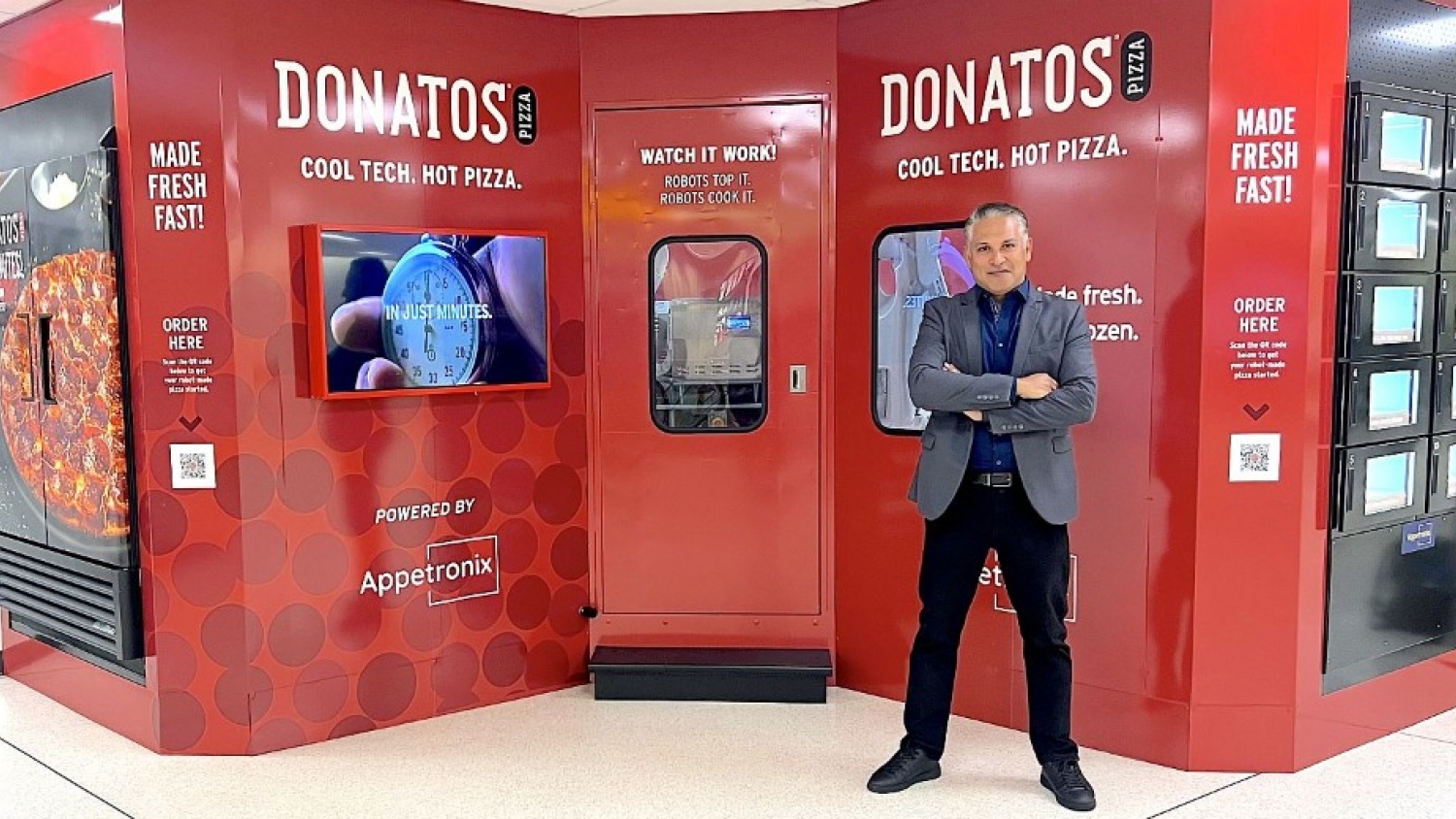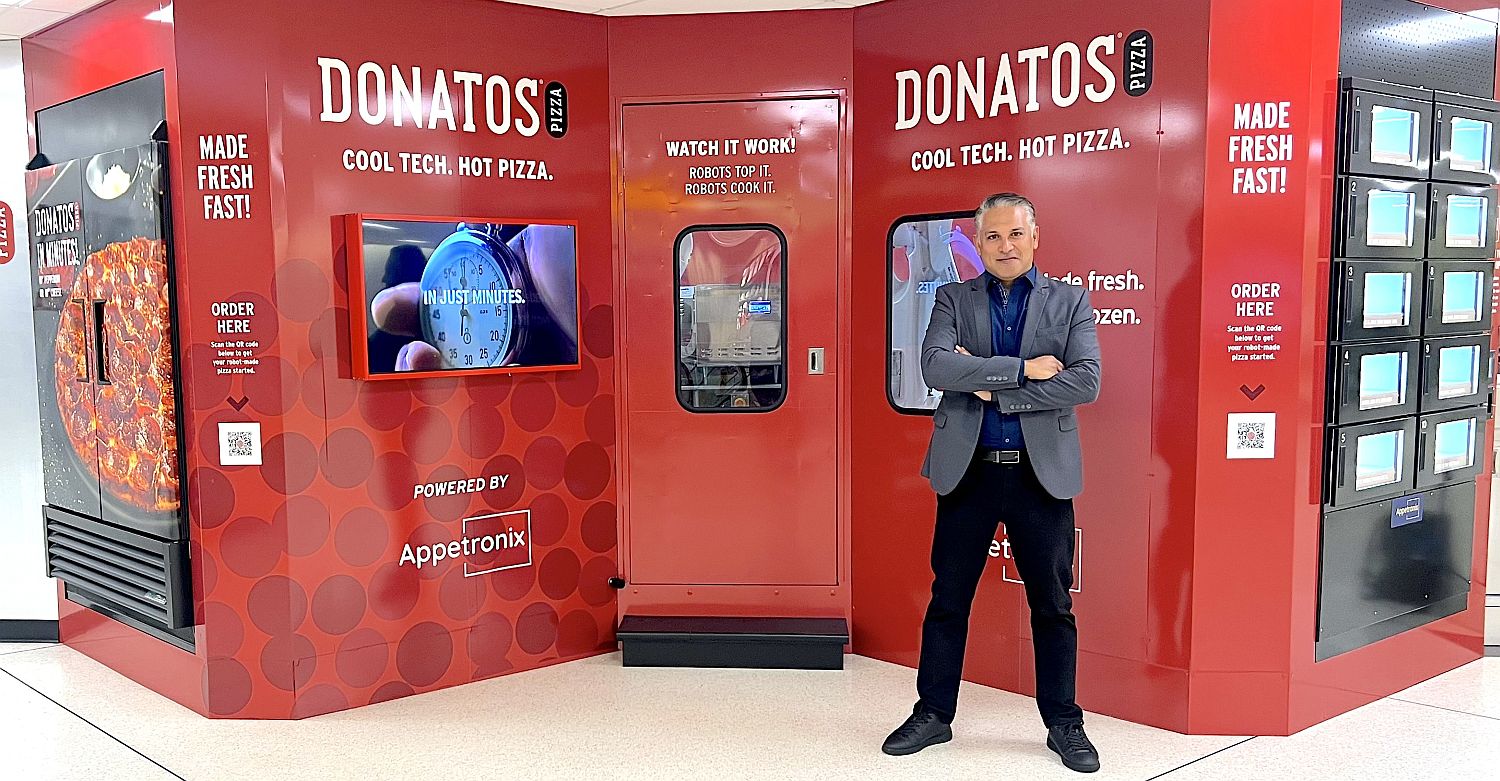
Toronto-based food robotics startup Appetronix has raised $6 million in a seed-plus round led by Jim Grote, founder of Donatos Pizza, the Grote family, and AlleyCorp, bringing the company’s total funding to $10 million. Founded in 2020 by Nipun Sharma, the company aims to revolutionize quick-service food by deploying fully automated kitchens capable of preparing pizzas, Asian noodle bowls, Mexican burrito bowls, and cookies around the clock in high-traffic locations.
The funding will allow Appetronix to expand its partnership with Donatos Pizza—a chain with over 460 locations across the United States—and explore collaborations with other brands in airports, hospitals, universities, entertainment venues, and office complexes. The startup recently launched its first automated pizza kitchen at Columbus International Airport in partnership with Donatos.
The startup differentiates itself from earlier food robotics initiatives by approaching kitchen automation from a factory-oriented perspective, rather than attempting to retrofit traditional restaurants. According to Sharma, the first generation of robotics firms “worked to a certain extent but didn’t really make sense from a financial point of view,” and the second generation, which built assembly lines inside existing kitchens, faced major practical limitations.
“I was out there looking for companies in the food robotics and AI space, met a bunch of companies and could not understand their business plan or unit economics,” Sharma told AgFunderNews. “It doesn’t make sense to retrofit a kitchen or raise millions of dollars for robots to flip burgers. You need to start from scratch without thinking about replacing what humans are doing, but how do you most efficiently make the product?”
Instead of mimicking human movements, Appetronix designs its kitchens from the ground up, prioritizing efficiency, quality, and reliability. None of the company’s engineers have worked in traditional kitchens. “There’s nothing to learn there,” Sharma said.

Partnering with established brands is central to Appetronix’s strategy. “I believe strongly that you buy food from a brand. You don’t want to buy food from Nipun’s Robo burger. You buy it from McDonald’s, from Five Guys. So we launched with Donatos Pizza.”
The Columbus robotic kitchen allows customers to place orders via a tablet or QR code, watching as pizzas are prepared, baked, sliced, and boxed. Different concepts utilize different technologies: the pizza kitchen uses robotic arms, while the noodle bowl concept relies on gravity-fed dispensing. Sharma noted that the noodle concept is the most challenging to automate due to the high variability of ingredients, while the Mexican concept introduces innovative methods for cooking proteins like chicken and beef.
Inventory is fully managed by the machines. In Columbus, the kitchen is operated by HMSHost, North America’s largest airport concessions manager. Machines alert staff when supplies are low, and all ingredients are cleaned and replaced daily. Routine maintenance is monitored remotely by Appetronix’s engineers.
Appetronix operates under a revenue-sharing model, rather than selling the machines. Each partner—the brand, the operator, and Appetronix as the platform—receives a portion of the revenue, which can range from $750,000 to $1.5 million annually per machine. Abe Murray, general partner at AlleyCorp, commented that the first unit “has proven that robotic kitchens can deliver authentic, high-quality food while bringing efficiencies to operators, in ways only robotic solutions can.”
The company has received positive feedback from the Columbus airport installation. “We’re filling a massive void,” Sharma said. “Once it was up and running, we started getting calls from theme parks, gas stations, EV charging stations, and big superstores.” Appetronix requires that day-to-day management is handled by partners who already oversee foodservice operations, which Sharma says “makes it a very viable model.”
Looking ahead, Appetronix plans to scale production internationally, outsourcing some manufacturing to Asia to meet demand. Sharma believes the sweet spot for robotic kitchens is quick-service environments, where customers prioritize speed, quality, and convenience over the dining experience itself. “With robotics, the impact is going to be very much on quick service… Now our biggest challenge today is how many machines we can make.”
The company’s strategy reflects a broader trend in foodservice automation, driven by labor shortages and the need for operational efficiency, accelerated during the COVID-19 pandemic. By creating purpose-built machines rather than retrofitting existing kitchens, Appetronix seeks to achieve the unit economics and reliability that previous generations of food robotics startups struggled to deliver.
Appetronix’s approach also emphasizes technology as a service. Remote monitoring of machines, cloud-based software management, and integration with existing operators’ workflows allow the company to maintain consistent food quality while minimizing operational complexity. This system also enables scalability across diverse locations, from airports and universities to entertainment venues and corporate campuses.
“The first generation of companies tried to imitate human movement; the second tried assembly lines. We focused on efficiency from the ground up, inspired by factories,” Sharma said. His approach underscores a key insight for robotics in foodservice: success depends on rethinking the process, not replicating human labor.
As Appetronix expands its partnerships and scales production, the company is working closely with AFN to redefine quick-service dining through 24/7 robotic kitchens that ensure consistent food quality, reduce reliance on labor, and offer brands a scalable revenue-sharing model. With backing from prominent investors and initial success in Columbus, the startup is positioning itself at the forefront of the next wave of food automation.
